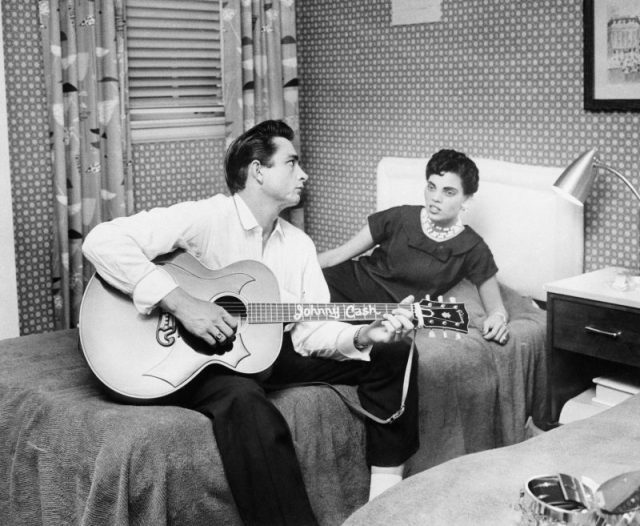
Johnny Cash’s distinctive tones have stirred the soul of many a listener. His music is powerful and honest, and those qualities were most in evidence on 1964’s Bitter Tears: Ballads of the American Indian (Columbia Records).
One of its tracks, “The Ballad of Ira Hayes,” paid tribute to the Native American soldier who helped lift the flag at Iwo Jima.
In an open letter to Billboard the same year he described himself as “an American who is almost a half-breed Cherokee-Mohawk (and who knows what else?).”

Cash performing in Bremen, West Germany, in September 1972. Photo by Heinrich Klaffs CC BY-SA 2.0
Singing loud and clear about the injustice meted out to Native Americans, Cash put his reputation on the line when those around him were cagey about the subject matter.
The release also put him squarely in the sights of white supremacist groups.
From the beginnings of his career Cash had a bona fide rebel status. His addictions to alcohol and drugs brought him into conflict with the authorities.
In late 1965 he fell afoul of the border police, who discovered a stash of pills he was attempting to smuggle between Mexico and the U.S.

Johnny Cash.
Luckily for him he escaped severe punishment, walking free with a fine. By his side was first wife, Vivian. She was an Italian-American who, unlike future spouse June Carter, stayed out of the limelight.
A photograph was taken of them outside the courthouse. It was a snap that should have passed into the files of the Associated Press as a celebrity footnote. It didn’t. The reason it didn’t was due to a simple matter of perception.

Johnny Cash and June Carter Cash.
The general newspaper reader would have glanced at the printed picture and thought no more about it. However, the beady eyes of the National States’ Rights Party took one look at Vivian and decided she was black. This white supremacist organization with links to the infamous Ku Klux Klan had its own media mouthpiece, a publication called The Thunderbolt.
If Cash had thought his troubles that day was over, he was going to get a nasty shock. The title of the Thunderbolt article said it all: “Arrest Exposes Johnny Cash’s Negro Wife.” There then followed offensive descriptions of Vivian and their children.
As quoted in The Georgia Straight article of August 2017, there was also a conspiracy theory about what were called the “race-mixers who are control of the recording industry.”
Cash retaliated with a lawsuit to the tune of $25 million.
There was a terrible fact behind this shameful discrimination. At the time interracial marriage was illegal in many states, so not only had the racists made a mistake they were also operating on a principle that was downright obscene in the first place.

Country musician Johnny Cash rehearses with his wife Vivian Liberto for his upcoming appearance on the television show Ranch Party. Photo by Bettmann / Getty Images
From that moment on, the couple were in the party’s sights. There was a campaign of intimidation, threats, and violence against Cash, lasting two years. The performer held his ground and eventually the furor died down.
The story was forgotten about by the wider world until last year when the rallies in Charlottesville brought Cash and his legacy to the fore. A participant was spotted wearing a T-shirt bearing the musical legend’s image. Cash’s family were not impressed.

Rosanne Cash at the 2006 South by Southwest. Photo by Ron Baker CC BY SA 2.0
Daughter Rosanne took to Facebook, where she posted a message reminding America that her Southern father was very much on the side of the oppressed, not the oppressors.
She wrote, “To any who claim supremacy over other human beings, to any who believe in racial or religious hierarchy: we are not you. Our father, as a person, icon, or symbol, is not you.”
Johnny Cash didn’t just leave behind a fine back catalog of music. He also instilled his strength and values in future generations so they, like his records, live on.
